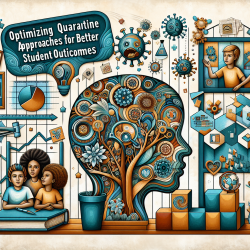In the dynamic field of speech-language pathology, staying abreast of cutting-edge research is essential for fostering the best outcomes for children. A recent study titled De Novo Missense Substitutions in the Gene Encoding CDK8, a Regulator of the Mediator Complex, Cause a Syndromic Developmental Disorder has unveiled critical insights that can inform our practice. This blog aims to distill these findings and suggest actionable steps for practitioners to enhance their therapeutic strategies.
Understanding the Research
The study identifies missense mutations in the CDK8 gene as a cause of a developmental disorder characterized by hypotonia, intellectual disability, behavioral disorders, and variable facial dysmorphism. CDK8 is part of the Mediator complex, a crucial regulator of gene transcription. The identified mutations affect the kinase domain of CDK8, leading to diminished phosphorylation of STAT1, a transcription factor involved in multiple signaling pathways.
Key Findings and Their Implications
- Genetic Mutations: Eight different heterozygous missense CDK8 substitutions were identified in 12 unrelated subjects. These mutations localize to the ATP-binding pocket of the kinase domain.
- Phenotypic Overlap: Affected individuals exhibit overlapping phenotypes including hypotonia, mild to moderate intellectual disability, behavioral disorders, and facial dysmorphism.
- Functional Impact: The mutations lead to reduced STAT1 phosphorylation, indicating a loss of kinase activity.
Implementing Research Outcomes in Practice
As practitioners, we can leverage these insights to tailor our therapeutic approaches. Here are some practical steps:
- Genetic Screening: Advocate for genetic screening in children with unexplained developmental delays and behavioral disorders. Early identification of CDK8 mutations can guide personalized intervention strategies.
- Multidisciplinary Collaboration: Work closely with geneticists, neurologists, and other specialists to develop comprehensive care plans that address the multifaceted needs of children with CDK8 mutations.
- Targeted Interventions: Develop targeted speech and language interventions that consider the specific phenotypic manifestations associated with CDK8 mutations, such as hypotonia and intellectual disability.
- Parental Support: Provide resources and support to parents, helping them understand the genetic basis of their child's condition and the importance of early and consistent therapeutic interventions.
Encouraging Further Research
While this study provides significant insights, it also underscores the need for further research. Understanding the full spectrum of CDK8-related phenotypes and the mechanisms underlying these mutations will enable us to refine our therapeutic approaches even further.
To read the original research paper, please follow this link: De Novo Missense Substitutions in the Gene Encoding CDK8, a Regulator of the Mediator Complex, Cause a Syndromic Developmental Disorder.










